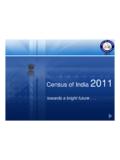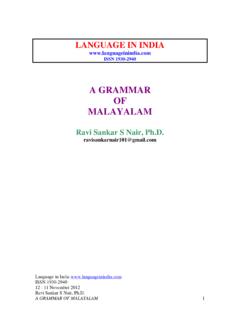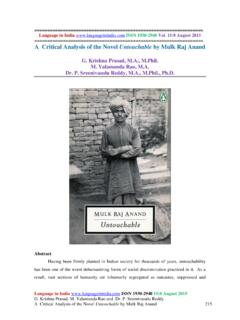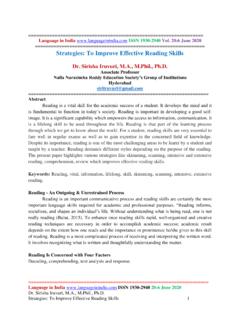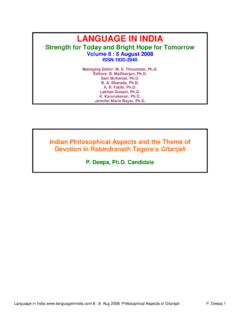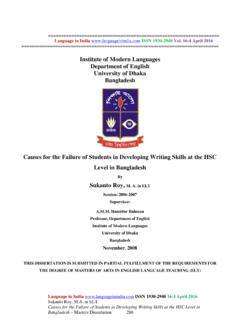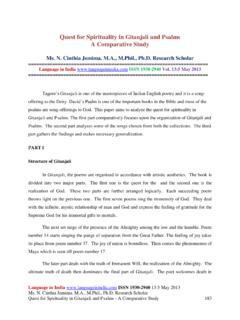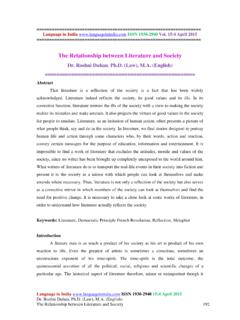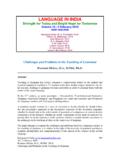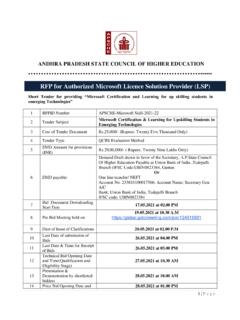Transcription of Foundations of Curriculum in Education - Language in India
1 Language in India 224 11 : 5 May 2011 Amtul Hafeez Chaudhry, , Aijaz Ahmed Gujjar, Candidate and Muhammad Ramzan, Foundations of Curriculum in Education Language IN India Strength for Today and Bright Hope for Tomorrow Volume 11 : 5 May 2011 ISSN 1930-2940 Managing Editor: M. S. Thirumalai, Editors: B. Mallikarjun, Sam Mohanlal, B. A. Sharada, A. R. Fatihi, Lakhan Gusain, Jennifer Marie Bayer, S. M. Ravichandran, G. Baskaran, L. Ramamoorthy, Foundations of Curriculum in Education Amtul Hafeez Chaudhry, , Aijaz Ahmed Gujjar, Candidate and Muhammad Ramzan, ======================================== ====================== Introduction Curriculum development not an easy task it require technical competence, ability to understand Curriculum problems and also understanding Curriculum development process prevailing all over globe.
2 Curriculum developers should ensure that they are working in accordance with national goals, ideas and aspirations. Curriculum development is a process which has relies on certain basis or Foundations . These Foundations are very important. These Foundations are built on certain factors and theoretical aspects. Curriculum developers have knowledge of theoretical aspect of their work which in other words refers to Foundations of Curriculum . The Curriculum foundation may be defined as those basic forces that influence and shapes of minds of Curriculum developers and enhance the content and structure of the subsequent Curriculum . Ideas about Curriculum do not arise automatically in vacuum.
3 Such ideas are actually based upon views about nature, source of values, worthwhile, knowledge and the role of teachers and the school. Therefore the development of Curriculum depends largely on the ideas that grow out of the fields of philosophy, psychology and sociology. Language in India 225 11 : 5 May 2011 Amtul Hafeez Chaudhry, , Aijaz Ahmed Gujjar, Candidate and Muhammad Ramzan, Foundations of Curriculum in Education a. The literature in this area generally distinguishes three categories of sources for Curriculum Foundations . [Tyler1949; Lawton 1973; Tanner & tanner 1930; Taba 1962; Saylor, Alexander & Lewis 1981;Eisner 1979; Brady 1992] a. Studies of learners and learning theory [psychology].
4 B. Studies if life [sociology and culture]. c. Study of nature and value of knowledge. [Philosophy] These sources of Curriculum Foundations constitute the principal area of the Curriculum development and effect the ways the developers think and conceive about curricula. Philosophical work can help Curriculum developers to understand the . Nature of objectives . Structure and interrelationship of objectives.. Nature of Curriculum activities.. The structure of Curriculum plan and the contents and method. Philosophical Foundations of Curriculum Philosophy is the quest of wisdom and facts. It is the study of realities and principles. It concerns with the research of inner truths. Philosophy provides organized procedure for clarifying issues, problems and making decisions on critical points of Curriculum development.
5 Philosophy and philosophical assumptions are basic to all Curriculum Foundations as they are concerned with making sense of what we encounter in our lives. Philosophical foundation of Curriculum is always search for truth and realities. It can better inform what comprise a good Curriculum . Philosophy can be developed by involving all concerned. For example to develop school system philosophy we can involve persons, teachers, students and parents and the community. (Golen, 1982) Curriculum development is a continuous process in which aims, goals and objectives are derived from philosophy of Education , then according to those content will be selected, then learning experiences are organized and at last but not least evaluation will be made, to check whether our objectives have been achieved or not.
6 So philosophy is extremely important in the process of Curriculum development. Philosophical Categories Major philosophies of life and Education have traditionally been defined by three criteria: What is good? What is true? What is real? (Hass, 1987) Every body perceives these criteria differently. Language in India 226 11 : 5 May 2011 Amtul Hafeez Chaudhry, , Aijaz Ahmed Gujjar, Candidate and Muhammad Ramzan, Foundations of Curriculum in Education There are four categories that have particular relevance for Curriculum development. i. Ontology [the nature of reality] ii. Epistemology [the nature of knowledge] iii. Axiology [the nature of value] iv. logic Ontology In philosophical Language , the study of reality is called as ontology (Hass, 1987).
7 Ontology is concerned with the nature of reality and by asking the questions what is real . A number of curies become clear. While this question may appear simple at the first glance, it deserves greater consideration. Different societies, ; perceive reality in quite different ways, as do the individuals, who constitute these societies, it was accepted as real that the earth was flat, yet today we would regard this as nonsense. Similarly one society may regard the use of the chemical fertilizers as essential, while other may consider biological waste more useful then the chemical. (Shahid, 2002) Thus, what is real to a society is very important and must be taken in to account while constructing account indeed, some Curriculum developers see their role as a vehicle for change (Shahid, 2002) In our Curriculum main task is that we expose students to nature of reality.
8 Students can acquire the reality of natural world through science, the reality of the social world through social studies, and the reality of communication through reading and Language arts. (Schubert, 1980) Epistemology Ontology Reality Knowledge Logic Deductive Inductive Values Ethics Aesthetics Axiology Epistemology Language in India 227 11 : 5 May 2011 Amtul Hafeez Chaudhry, , Aijaz Ahmed Gujjar, Candidate and Muhammad Ramzan, Foundations of Curriculum in Education In philosophical Language , study of truth is called epistemology. (Hass, 1987) Epistemology is probably the branch of philosophy that most directly specks to Education .
9 It deals with nature of knowledge and knowledge process. (Schubert, 1980) For walkers and walkers epistemology is the study of the nature, scope and applicability of knowledge. In Curriculum , where what we advocate becomes the basis for student learning, we all are centrally concerned with the nature of knowledge, how we know and how we know what we known. (Print, 1993) When posing epistemological questions in Curriculum we ask; what is true? How do we know the truth? How do we know that we know? These are obviously vital questions for Curriculum development. To consider particularly in a society which purportedly values truth and seeks to pass on truth to subsequent generations reference to how do we know if that is true?
10 How do we know that we know? To answer theses questions, it is important to examine the several different ways of knowing and their implications. Authority This is the oldest ways of acquiring knowledge. If we analyze the history of human beings, we will find out many authority figures tribal leaders, the poet, the priest, the ruler etc. In school settings knowledge can be acquire through authority figures which are textbook, the encyclopedia, the teacher, the administrator. Revelation It was considered as major source of knowledge in early human evolution. Then in every era religious beliefs are considered as truth. Empiricism This is a source of knowledge which is older than authority and revelation.
